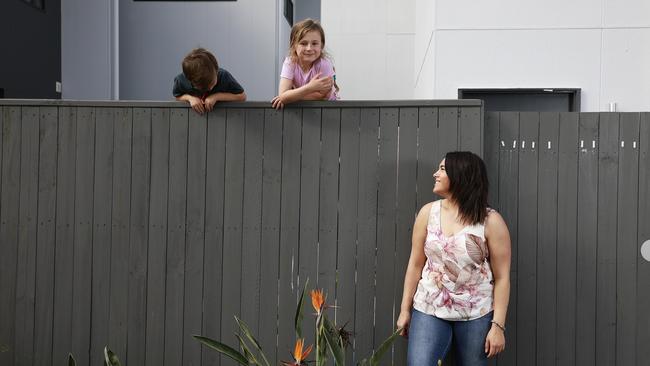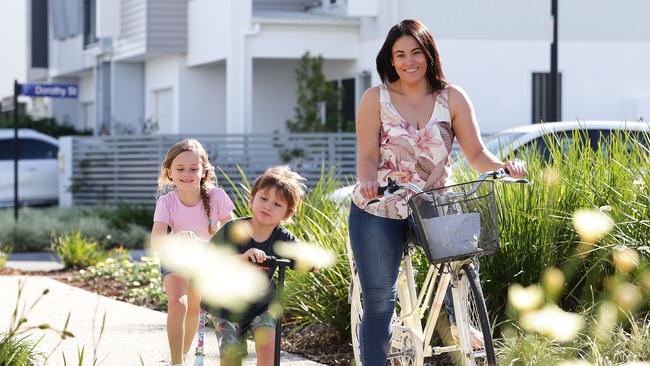Long distance call for mental health assistance for FIFO workers during Covid shutdown
As COVID-19 shut down swathes of the economy our mines kept operating, thanks to fly-in, fly-out workers. But more than three months in, was the price too high?

Kiara Sammut was an executive assistant to a CEO for years but always hankered to work on a mine site. As a single mother of two young children, the money was also attractive.
In January she got her wish, flying from her home at Caloundra on Queensland’s Sunshine Coast to the West Australian Pilbara. As she began training as a dump truck operator, Sammut looked forward to a career as one of the State’s 60,000 fly-in, fly-out (FIFO) workers.
Her roster of two weeks on, one week off, worked well. She shared parenting with her former partner but had the bonus of Arabella, 6, and five-year-old Chase full-time during her week back on the coast. Then in late March, in Caloundra for her week off, Sammut was called back to the Pilbara. Her company anticipated the border closure that came a few days later and the message to employees was clear: come back now if you want your job.
“I honestly thought I would only be away for four weeks,” Sammut tells The Deal. “Four turned into six, then eight, then it was three months.”
She spent her regular off week holed up in a Perth hotel until, desperate to see her kids, she took unpaid leave and returned to Caloundra.
It has been a searing experience; one suffered by many interstate FIFO workers who have held onto their jobs during the lockdown but have been unable to see their families for up to 20 weeks.
Now, new research from Curtin University has revealed the high toll border and quarantine restrictions are having on the mental health of workers, with 40 per cent reporting psychological stress — up from 33 per cent in pre-COVID research.
Preliminary results from a survey of 275 workers also show high risks of suicide among FIFO workers, and lead researcher Professor Sharon Parker, director of the Centre for Transformative Work Design, says there are some “quite devastating” quotes from respondents about the impact COVID is having on them.
“I am isolated and mentally drained,” wrote one worker.

None of it surprises Perth-based Andrew Hendrie, a Pilbara mobile plant operator for eight years, who runs an app called FIFO Life.
“FIFO has always been a big red flag for mental health in the first place,” he says. “Now with COVID, it’s like a bomb waiting to go off.”
The pressure on interstate workers — of whom there are about 6000 in normal times — has been intense because border controls and quarantine have left many stuck in WA if they want to continue working. Local workers are better off, although many have been on “COVID rosters” staying on site for up to six weeks at a time, to minimise people movement.
Tamryn Harvey, whose partner Kyle Death, has been away from their Queanbeyan, NSW home since mid-April, has seen friends’ marriages collapse under the strain. She is aware, too, of suicide attempts among FIFO workers.
“It’s rife over there at the moment,” she says. “They just don’t have an end date and I think that’s the hardest part. Most families were on rosters where people were coming home every two weeks but 15, 16, 17 weeks is too much.
“We were lucky (in the early stages of the lockdown) because Kyle was on five months paternity leave. But he had to fly back at the end of April and he has been there ever since.”
It’s been tough for Harvey, a horticulturalist who says: “Kyle is ex-army, so we were used to being apart, but not like this.”
Faced with the prospect that unless he went into quarantine her partner, who is a diesel mechanic in the Pilbara, would not be back before Christmas, Harvey and the couple’s children — Mia, 13, Jack, 3, and baby Hudson who is almost a year old — will relocate to Perth in August.

Sammut, who hopes to spend a month in Caloundra on unpaid leave is keen to return to the Pilbara but is worried about once again being stuck in WA for an extended period.
“You are on the other side of the country and there is no way to get home,” she says. “On site you just work, eat, sleep, repeat, but down in Perth (for her rostered week off) with nothing to do and nothing open, the reality hits you.”
She says resource companies need to step up and take more action to address mental health issues on site not just “put up a poster”. She says that at her site, employee support staff who helped with mental health issues were among the first to be laid off during COVID because the government deemed them “non-essential workers”.
Professor Parker says that many companies try hard to run activities and address the mental health risks. But more is needed because FIFO — with or without the COVID restrictions — is here to stay.
“We are trying to move away from this debate of should there be FIFO or not,” Parker says. “That’s not a healthy debate. There needs to be FIFO, so the question is, do we have to just accept that a third of all workers will face mental health challenges or are there things we can do about it? The evidence is very clear that if you create more positive cultures, decent rosters, more social support, people’s mental health is better.”
Parker, who is working with Dr Jess Gilbert of Curtin University and Dr Laura Fruhen of the University of Western Australia, says that while part of the problem is being away from family and friends, there are other factors: “Do people have good social connections when they are away, access to barbecues and social nights? Do you have a leader who is supportive and interested and cares about you? Do you have more flexibility about when you can contact your family?”
The survey, funded by the Australia Research Council, found a “very high degree of loneliness” says Parker. One third of workers report sometimes being lonely when at camp or on site, and another 35 per cent being “often” or “always” lonely on site. Fatigue is a problem with employees often working 12-hour shifts. Some travel an hour each way from their accommodation to the site. Thirty per cent of workers say they are “tired out, for no good reason” most or all of the time.
Something as simple as being assigned a permanent room can make a big difference, Parker says: “On some sites people have to stay in a different room when they come back from their time off. But we found those who stay in the same room have better mental health.”
Parker and a team from Curtin and UWA carried out a major 2018 study for the WA Mental Health Commission after concerns about mental health on remote mines. That study covered 3000 FIFO workers and their partners and found 33 per cent had high or very high psychological distress, compared with 10 per cent in the general population and 17 per cent in a benchmarked group of similar workers in non-FIFO situations. The 2018 survey also found FIFO workers scored significantly worse than the benchmarked group on a sense of belonging, a measure used to indicate suicidal thoughts. They also reported higher levels of suicidal intent.
When COVID-19 hit, Parker and her co-researchers grabbed the opportunity to do a second survey. “Everyone knew it was a potential problem and while our current results are only preliminary, they suggest, as we feared, an increase in mental health concerns for this already vulnerable group of workers,” she says. “In our previous research, we found that suicide risk was higher for this group of workers compared to Australian norms, so there was already cause for concern.
“Our preliminary analyses for the FIFO workers during COVID-19 suggest that many more workers are at risk than was even the case shown in our previous research — which is worrying. We are conducting more analyses to understand this further, and our sample is relatively small, but we nevertheless urge companies, unions, family and friends to do all they can to support FIFO workers.”
Parker says workers fear raising concerns about mental ill health because they think it will harm their career, change the way peers and leaders see them, and will mean they are seen as weak.
On the plus side, about 70 per cent felt supported by their work colleagues and feel they can talk to them about problems. More than half of the sample reported high levels of work-family conflict, for example, feeling they can’t fulfil family responsibilities.
Workers also listed examples of good practice such as companies paying for people to self-isolate, daily barbecues, and sending high-risk workers home on paid leave.
But Parker says rosters need to be addressed.
“Pre-COVID, and this was extremely contentious, we spent a lot of time debating with the Chamber of Commerce about having better rosters, such as one week on, one week off,” she says. “We got a lot of push back from industry because of course there is a cost implication.”
With a home in Perth and a roster of three weeks on site, and one week off Andrew Hendrie enjoys FIFO. It’s been a bit tougher since he met his partner Jenny Delargie two years ago. Delargie also works FIFO on another site but their rosters coincide.
Hendrie tries to be disciplined on site, spending his evenings in the gym rather than the bar. He’s busy, too, with his app, FIFO Life, which has been downloaded more than 20,000 times and helps workers schedule their rosters as well as offering resources on relationships and wellbeing.
There’s also a “Countdown” page — a digital calendar showing the days, hours, minutes and seconds before the next reunion.
The researchers are keen to survey more workers. You can find the survey at www.transformativeworkdesign.com/fifo-mental-health-survey
-
Help is available at Lifeline 13 11 14


To join the conversation, please log in. Don't have an account? Register
Join the conversation, you are commenting as Logout